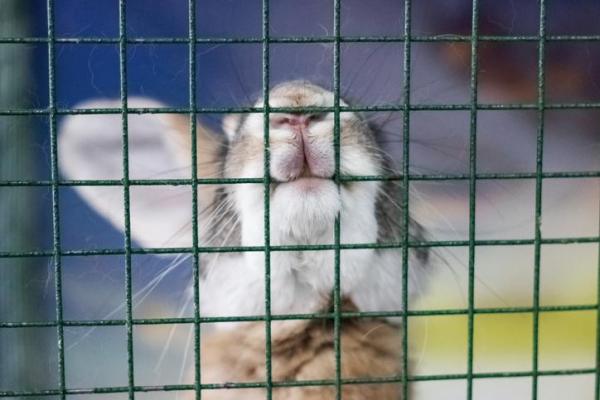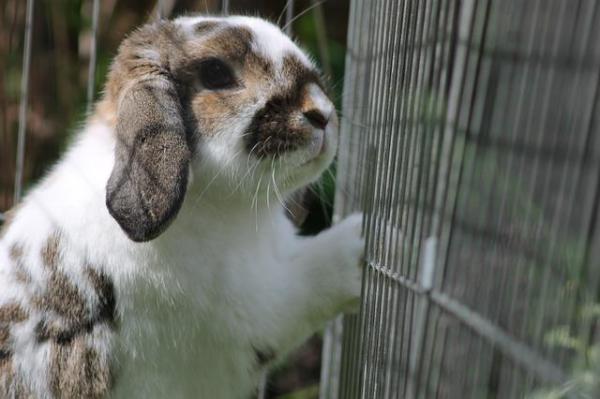
The noise of a rabbit chewing on their cage bars is common to most every rabbit guardian. It is a very common behavior which doesn't necessarily pose a threat to their health. However, as with practically any behavior in rabbits, if we see them enacting a habit compulsively, it may mean there is a problem. We should know that rabbits are social and active animals, so they need to spend most of their time outside their cage. If this is the case, why do we often see rabbits biting their cage in the morning?
In this AnimalWised article on my rabbit keeps on biting their cage, we look at the reasons behind this behavior. We also look at when they need intervention and what might be done about it.
Why do rabbits bite their cage?
The first thing we need to know is that biting the bars of their cage, is a relatively common habit of the rabbit. It doesn't necessarily mean they have a problem, but here are the reason behind chewing and biting their hutch or cage:
It wears down their teeth
Unlike many mammals, rabbit teeth do not stop growing. Instead, they grow continuously, requiring the rabbit to file them down until they are a suitable length for chewing their food. If, for any reason, the rabbit is unable to file their teeth, it will result in abnormal teeth growth. This can cause the teeth to dig into the flesh on their mouth and can be fatal if not treated.
A rabbit may bite and gnaw on their cage bars to help with the filing process. However, the wires of a hutch are usually not the most suitable for filing teeth. Using chew toys, wood blocks and providing plenty of hay should be better options.
They want to get out
While a rabbit should feel safe in their hutch, they also have a tremendous need to move around and explore. They also have different activity levels throughout the day, so living in a cage can interfere with these needs. When your rabbit is biting their cage bars, it could be due to
- Stress or nerves
- The cage is small and cannot move
- Boredom
If your rabbit wants to get out of their hutch, biting their cage might be an indication of this desire. Although we would ideally be able to have a space where the rabbit is able to roam as free as possible in a safe environment, this is a luxury unavailable to most households. A hutch should be a safe space for a rabbit and have all of their needs covered, but they should be allowed outside as much as possible.
If you are unsure what the rabbit may need in terms of hutch quality, we can help. Our guide to building a rabbit hutch will show you everything you need to consider what kind of home they need.
They are bored
Another reason why a rabbit chews on their cage bars is due to boredom. Whether from being alone or a general lack of stimulation, rabbits can become driven to distraction. Since they are very curious and social animals, not being able to interact with others can have a devastating effect on their well-being. Biting the cage is a symptom of boredom. One solution may be to keep them in pairs, but all rabbits will need space to run and play.
You could also try to introduce better environmental enrichment. This might include providing playhouses, rabbit runs or even chew toys. The chew toys are helpful, in particular, for preventing cage bar biting. Ideally, you should have different accessories which you can swap out every couple of days to keep them interested. We also have some ideas for DIY toys as another way to prevent boredom in rabbits.
They want your attention
As stated above, rabbits are very social animals. They like to be with others, whether rabbits, people or even well-socialized pets of other species. Without such interaction they can become sad and anxious. If your bunny bites their cage when you walk by or they are looking over to you, they may simply want your attention.
Although we might prepare the rabbit's hutch or cage to the correct standard, we still need to ensure it is maintained. If the hutch is dirty, they do not have enough food, water or other basic supplies, they may bite their cage to get us to remedy the situation.

How much space does a rabbit need?
If you are considering adopting a rabbit, you need to prepare to share you life with them. They should not be kept completely separate or at least have an environment which is beneficial for them. For example, you can keep them in a hutch located outside which has natural elements to make them feel secure. But if you keep them inside, it needs to be somewhere family life takes place, not in a sheltered place with no stimulation.
While many families decide to adopt a rabbit thinking it is low maintenance, this is not quite the case. Bunnies need maintenance and care which can take time. They are living beings with complex needs and require basic welfare freedoms to have an appropriate life. Running around is in their blood and not letting them express this innate need can result in behavioral problems, including biting their cage.
Generally, rabbits will need about 6 m2 to run around in. Whether this is a room in the home or a rabbit run, they will need space to exercise and hop. However, a rabbit hutch will need to be large enough for a rabbit to stand up in, hop about three times end to end and allow them to stretch out. This means it should be about 12 square foot, although this may need to be increased depending on the size of the rabbit and whether they ar alone.
The rabbit needs a lot of space to be able to make the following movements and maneuvers, just as they would in their natural habitat:
- Do a binky (a special jump rabbits do)
- Have somewhere to run when scared
- Play with accessories or toys
- Have space to separate from cage-mates
- Jumping for joy
- Stay fit and active to avoid obesity
Alternatives to cage bars
Constancy biting their cage bars can be harmful to a rabbit's teeth, depending on the material and type of cage. Additionally, their coating can be toxic. Another problem can affect us, specifically when biting their cage bars causes noise and disturbs us in the night. If we want to avoid the rabbit biting their bars, we can replace then with clear sheets of methacrylate or transparent compact polycarbonate. However, we need to be extra sure the rabbit's hutch still has sufficient ventilation if we do.

How do I prevent my rabbit biting their cage?
Rabbits are sensitive animals which can be somewhat demanding. However, if we take care of them with respect and affection they will accept us as family. By following these tips, we can best ensure that our bunny has a long and happy life, as well as prevent biting their cage:
- Adopt Another Rabbit: since rabbits are gregarious animals, they should never be alone. Therefore, if you live with a bunny one at home, we advise you to consider the possibility of adopting another rabbit to keep them company.
- Give them space to play: when your rabbit lives inside, make sure the apartment or house is safe for them and has plenty of space for daily exercise. They often like to chew on wires, the legs of chairs, furniture and textiles. You can design an enclosure in the garden and give them more freedom. A standard cage can never be the only habitat of rabbits.
- Understand them: don't be angry if the rabbit makes noises at night. They are crepuscular, which means that they get up very early. Their activity, some of which will make noise can happen at night or early morning. This behavior is normal and should be tolerated at home.
- Pay attention: rabbits need a lot of affection, especially if they do not have a companion of the same species. Spend time and you will see how you will eventually have a more loving and calm rabbit by your side.
- Keep their cage clean: cages or enclosures must be cleaned regularly. A dirty cage is not only unhygienic for your animal, but it will make your rabbit more uncomfortable and therefore noisier.
Cover the rabbit's cage at night
Many rabbit guardians believe that covering the rabbit's cage at night will help them stop biting. While this practice may work momentarily, it can be dangerous for the rabbit. In fact, covering the rabbit's cage can increase the temperature significantly. Rabbits generally experience lower temperatures better than warm spaces. The ideal ambient temperature for them is between 18-20 ºC (64-68 ºF), so if we cover their cage we can increase the risk of heat stroke.
If they live inside the home, where temperatures are not usually very low at night, it will not be necessary to cover their cage. However, if your bunnies live outside in the garden or on the terrace, and temperatures reach below zero at night, it will be necessary to protect their enclosure from the cold. In these cases, it is very important the rabbits have a shelter in which to hide with plenty of hay to keep them comfortable and satiated. When covering their enclosure, make sure it has proper ventilation so that the rabbits have fresh air.

If you want to read similar articles to My Rabbit Is Biting Their Cage, we recommend you visit our Behavioral problems category.
- Wegler, M. (2004). Rabbits: healthy and happy. Editorial HISOANO EUROPEA.
- Wegler, M. (1998). Rabbits: Know how to take care of them and understand them. Editorial Everest.